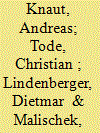| Srl | Item |
| 1 |
ID:
112900


|
|
|
|
|
| Publication |
2012.
|
| Summary/Abstract |
In this paper, we develop a methodology for deriving a consistent measure for supply adequacy in the power generation sector. We especially consider the secured generation capacity of intermittent renewable energy sources such as wind. Availability of conventional power plants is estimated through stochastic convolution of unscheduled non-usabilities. We employ our methodology to measure supply security in Germany until 2030. A detailed market analysis of power plants that are currently being built or planned provides support to our analysis for the short term. For the long term, we rely on a large-scale dispatch and investment model of the European power sector to account for the embedding of the German electricity sector in the European market. We analyze two scenarios: one with prolongation of nuclear power plants and one with a nuclear phase-out. Our results show that, even though intermittent renewables only provide very limited secured generation capacity, security of electricity supply in Germany can be assured until 2015. In the long term, the need for backup capacity for renewable energy sources increases as well as the need for electricity imports.
|
|
|
|
|
|
|
|
|
|
|
|
|
|
|
|
| 2 |
ID:
150445


|
|
|
|
|
| Summary/Abstract |
The enactment of the Energy Concept by the German Government in 2010 set ambitious targets for the future energy transition in Germany. The most prominent goals include a greenhouse gas (GHG) emission reduction of the economy and an increase in the share of renewable energy in the whole energy sector. Since the long run effects of these policy measures are hard to assess, science-based policy evaluation methods are needed to identify weak points and areas with a need for action. This paper presents the results of the German Energy Reference Forecast with a focus on the electricity sector. It is based on an investment and dispatch model for the European electricity sector over the planning horizon of the ‘Energiewende’ up to 2050, with an emphasis on the time period up to 2030. We find that almost all targets of the German ‘Energiewende’ are not reached, for the case in which no further measures are undertaken. In particular reductions in GHG emissions fall short to the target value. Contrary to the negative results, e.g., regarding GHG-emissions as well as gross electricity consumption, generation from renewable energy sources will exceed the policy's target value.
|
|
|
|
|
|
|
|
|
|
|
|
|
|
|
|